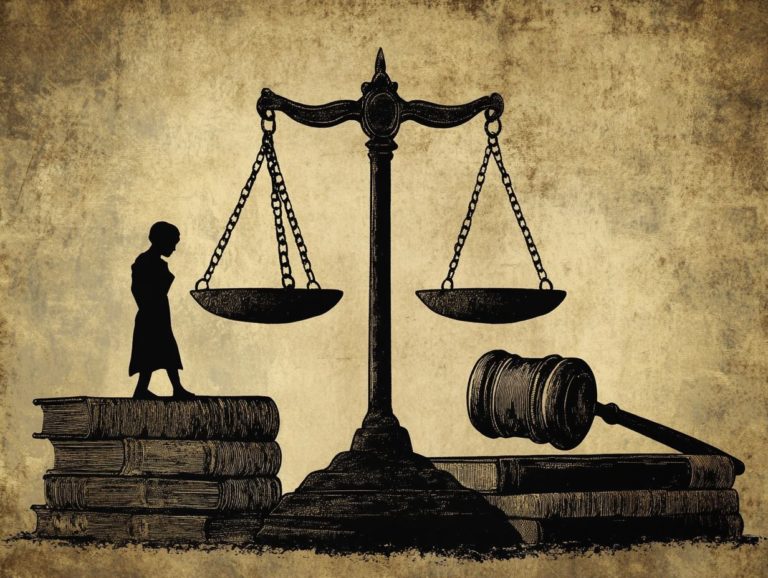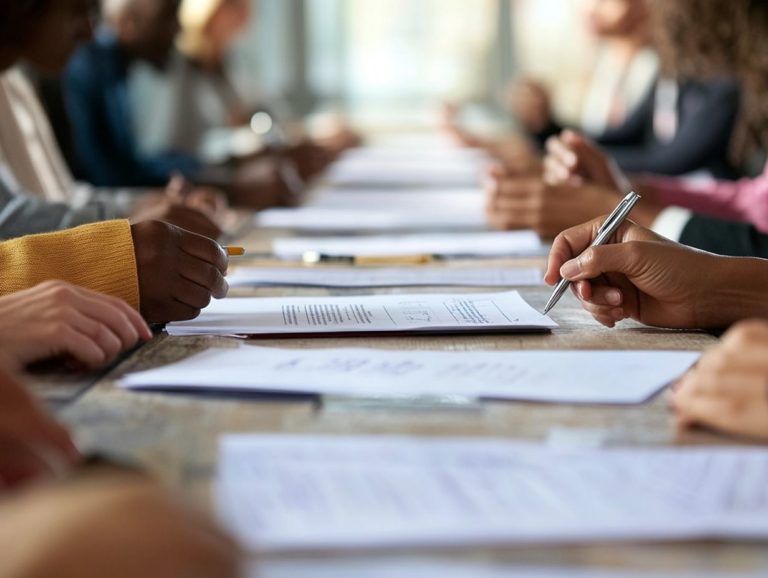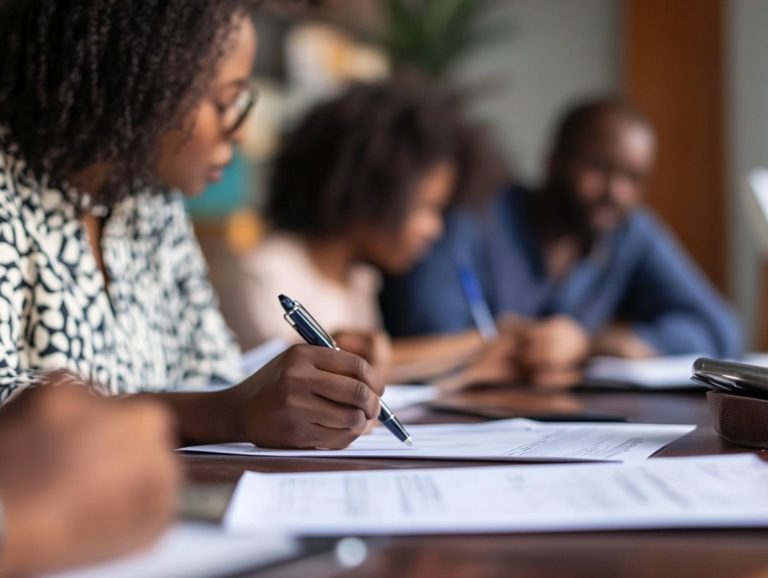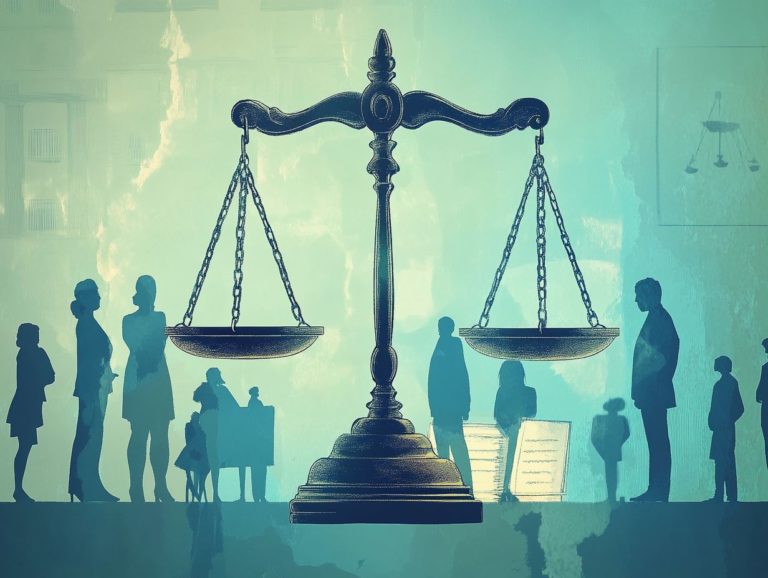The Importance of Documenting Rights Violations
Human rights represent the essential freedoms and protections to which every individual is entitled. Yet, violations occur worldwide, often slipping under the radar.
This article delves into the many forms of rights violations. It examines the profound impact of documenting these incidents and the methods used from cutting-edge technology to time-honored traditional practices.
You’ll discover the challenges that accompany this vital work. These include ethical considerations and resources available for those dedicated to holding perpetrators accountable.
Explore with us the significance of documenting rights violations. It plays a crucial role in advancing justice and raising awareness.
Contents
- Key Takeaways:
- Understanding Rights Violations
- The Impact of Documenting Rights Violations
- Methods of Documenting Rights Violations
- Challenges and Considerations
- Resources and Support for Documenting Rights Violations
- Frequently Asked Questions
- What is the importance of documenting rights violations?
- How can documenting rights violations protect vulnerable populations?
- Why is it important to have accurate and detailed documentation of rights violations?
- What role do human rights defenders play in documenting rights violations?
- How can individuals contribute to documenting rights violations?
- Are there any risks involved in documenting rights violations?
Key Takeaways:
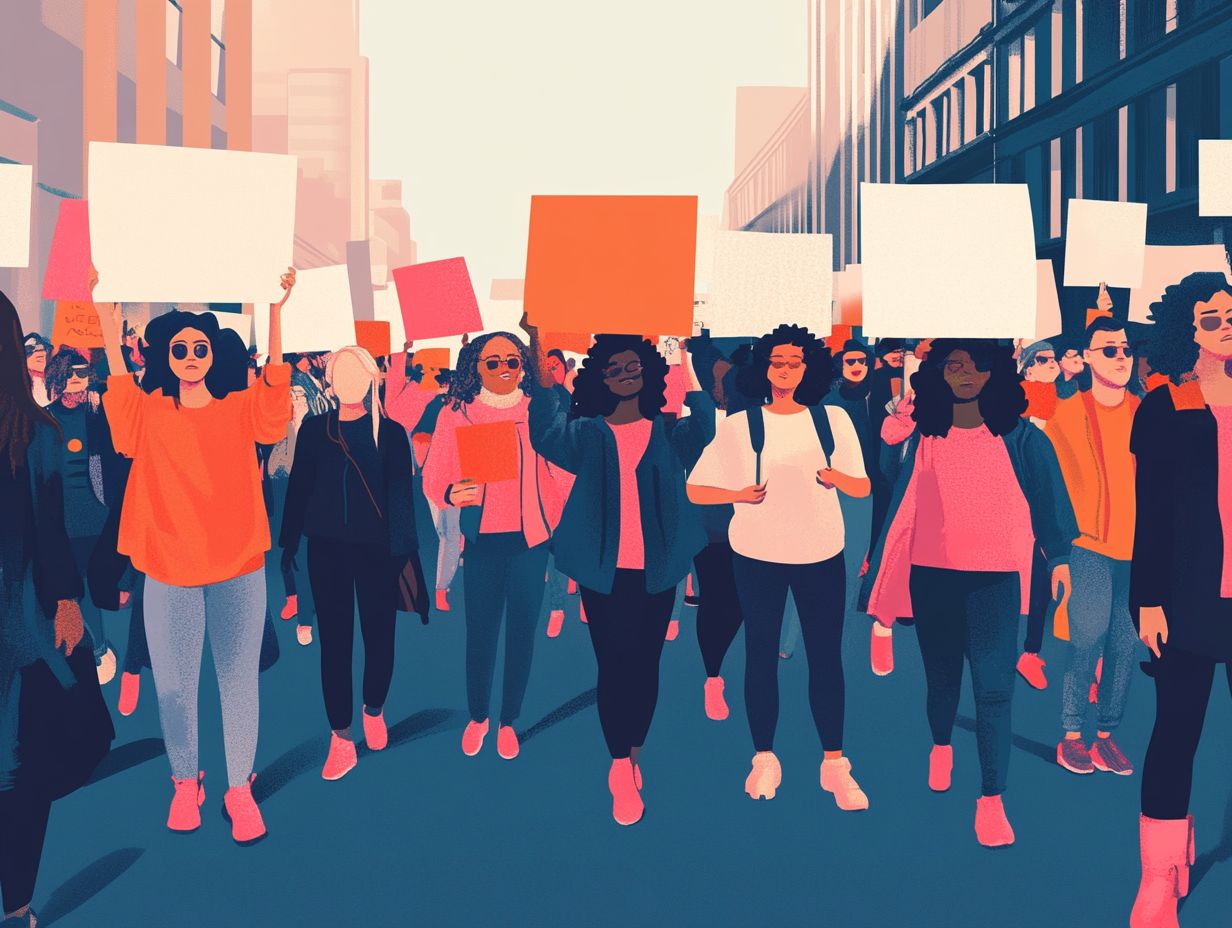
Documenting rights violations raises awareness and holds perpetrators accountable. Methods include technology and traditional practices. There are obstacles and ethical considerations, but resources and support are available.
Understanding Rights Violations
Grasping the intricacies of rights violations is essential for appreciating their far-reaching effects on society, especially concerning human rights and workplace issues.
These violations can take many forms. They can impact employee rights and lead to wrongful termination or discrimination claims.
By uncovering patterns of misconduct, you pave the way for legal action. This can champion change in both digital and physical realms.
This approach helps tackle urgent matters like privacy violations. It guarantees the protection of human rights across diverse regions, from New York City to Asia, Africa, Europe, and the Americas.
What are Human Rights?
Human rights are fundamental entitlements inherent to you as an individual. They encompass civil, political, economic, social, and cultural rights, including employee rights and digital rights, which are crucial protections against privacy violations.
These rights hold significant importance in various contexts. For example, workplaces must demand fair treatment and equitable pay, while online environments require robust safeguards against data breaches and cyberbullying.
Advocacy strategies are essential in ensuring these rights are not just recognized but actively upheld. Organizations like HURIDOCS provide vital tools and resources that enable effective documentation.
By fostering awareness and facilitating communication among advocates, these organizations contribute to a culture of respect. This allows individuals to flourish in both professional settings and the digital landscape.
This highlights the interconnectedness of rights in today s society. Your rights are integral to your overall well-being.
Types of Rights Violations
Rights violations can manifest in various forms. This includes workplace infringements, wrongful terminations, discrimination issues, and privacy breaches that encroach upon individual freedoms.
These violations often appear when an employer dismisses an employee without just cause. They can also occur when a hostile work environment is fostered based on race or gender, or when personal communications are unlawfully surveilled.
The repercussions extend far beyond the office. These violations impact your mental and emotional well-being, potentially leading to significant financial hardships.
If you find yourself facing such violations, it’s crucial to know you have the right to seek legal recourse. This highlights the essential need for organizations to uphold ethical standards and adhere to labor laws.
By being aware of your rights, you enable yourself and contribute to cultivating a culture rooted in respect and accountability.
The Impact of Documenting Rights Violations
Documenting rights violations is an essential step in advocating for meaningful change. It helps hold perpetrators accountable.
This process provides vital evidence and uncovers patterns of misconduct. Let s make a difference together!
By meticulously recording these violations, you enable yourself and others in the pursuit of justice.
Join us in documenting rights violations. Your voice matters in the fight for justice!
Raising Awareness and Holding Perpetrators Accountable
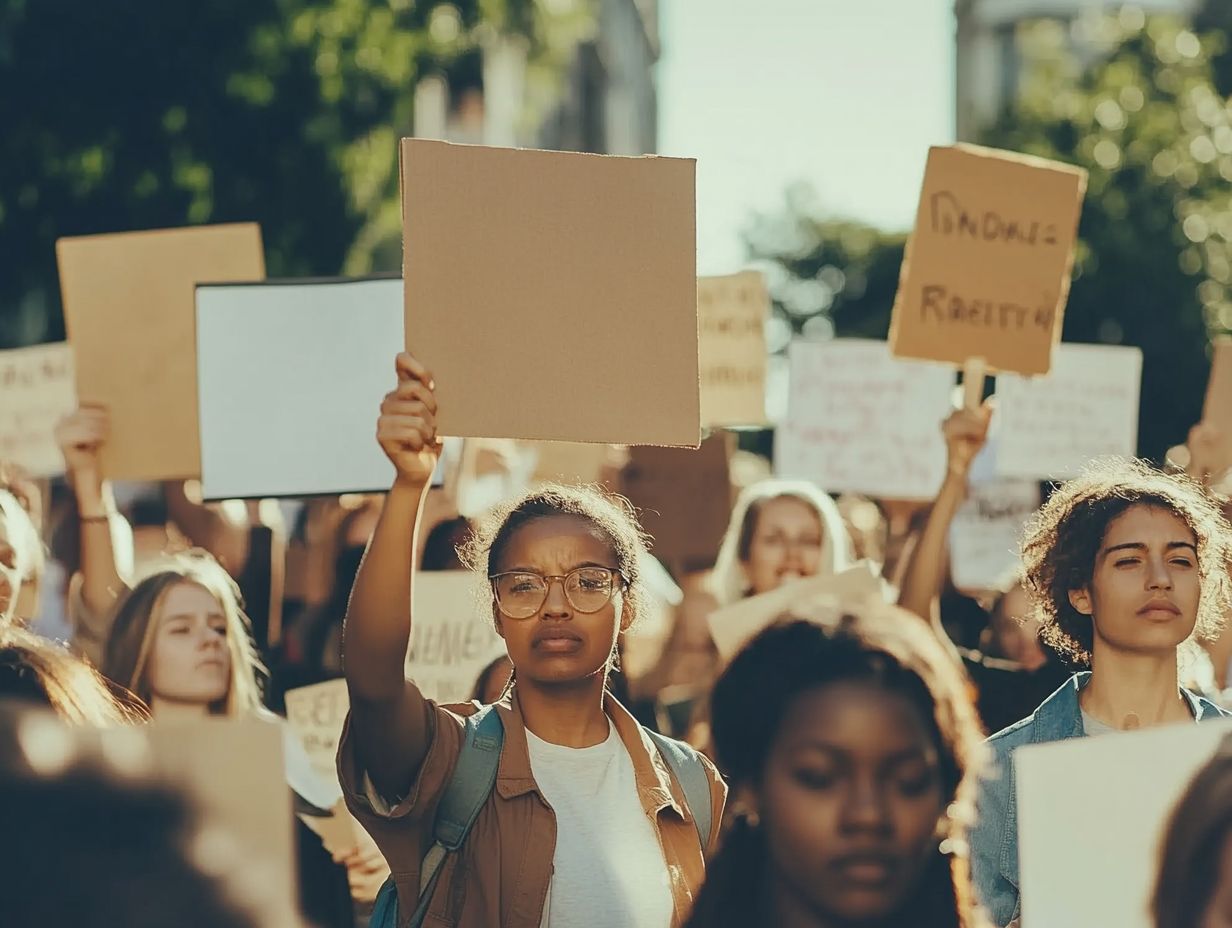
Raising awareness about rights violations requires effective advocacy strategies. Collaboration with organizations like HURIDOCS, a platform that supports human rights documentation, and The Samuel Law Firm is essential.
By fostering partnerships with human rights defenders, community leaders, and digital advocacy groups, you can mobilize resources and amplify your voice in the battle against injustices.
Awareness campaigns not only inform the public about infringements on digital rights. They also enable individuals like you to speak out and demand accountability.
Legal actions serve as a crucial mechanism for redress, sending a clear message to violators that such behavior will not be tolerated.
Organizations play a key role in documenting abuses and developing legal frameworks that protect rights, opening doors for more inclusive conversations and solutions that actively engage various communities in the advocacy process.
Methods of Documenting Rights Violations
Methods for documenting rights violations are diverse, encompassing both traditional practices and cutting-edge technology. Each approach is designed to collect credible evidence that supports claims and advocates for justice effectively.
Technology and Traditional Methods
Technology has transformed how you document rights violations, equipping you with powerful tools for collecting and preserving evidence, while traditional methods maintain their vital significance in various contexts.
With the rise of digital tools like smartphones, social media platforms, and specialized applications, capturing and sharing instances of abuse in real-time has never been easier for you and your organization.
Take mobile apps like Eyes on the Ground, for example. They enable swift information sharing about human rights violations, prompting rapid responses from advocacy groups.
However, don t underestimate the value of traditional methods. Written reports and in-person testimonies provide essential credibility and depth that quick online snapshots might lack.
Each approach serves its purpose: technology amplifies outreach and visibility, while traditional practices imbue advocacy efforts with thoroughness and legal weight.
Challenges and Considerations
Documenting rights violations is crucial, but you’ll face challenges that shouldn’t stop you. From hurdles in legal processes to ethical dilemmas that may surface during your documentation, each step requires careful thought and attention.
Obstacles to Documenting Rights Violations
Obstacles to documenting rights violations can include legal hurdles, limited access to evidence, and a palpable fear of retaliation all of which can hinder your efforts in advocating for justice.
These challenges present significant barriers to accountability. Victims may hesitate to come forward, worried about their safety or potential legal consequences. Without credible evidence to back up claims, the chance of pursuing legal action diminishes significantly.
This lack of documentation not only weakens the legitimacy of advocacy efforts but also perpetuates a cycle of impunity. Therefore, it’s crucial for you, as an advocate or part of an organization, to develop robust strategies for evidence collection that prioritize the protection of witnesses.
By doing so, you can ensure that human rights violations are properly recorded and effectively challenged.
Ethical Considerations
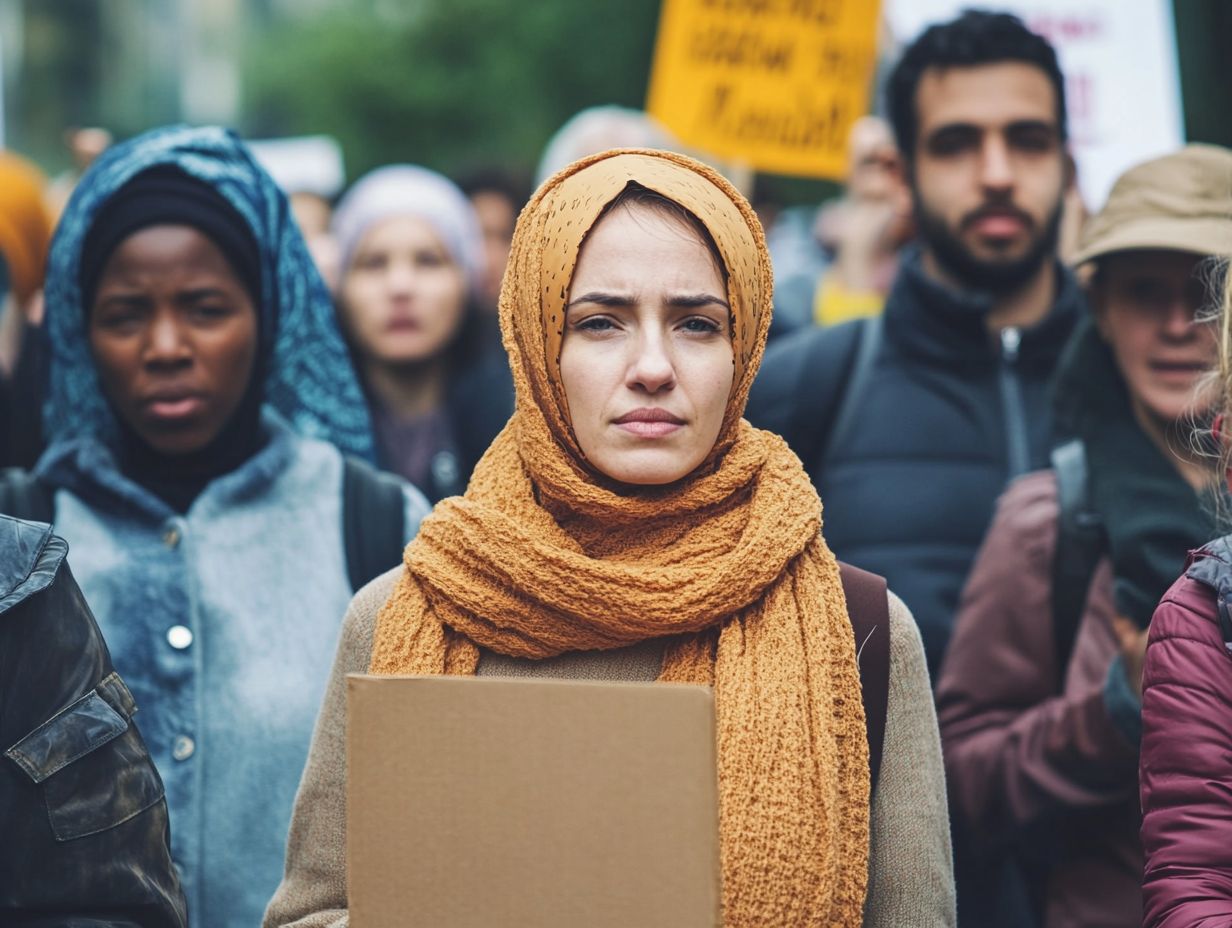
Ethical considerations in documenting rights violations are crucial, especially regarding privacy concerns and ensuring the rights of employees and victims are upheld throughout the process.
You must manage various ethical responsibilities, particularly when seeking consent from individuals who may already find themselves in vulnerable situations.
A transparent dialogue about how the information will be used helps protect victims’ identities. This minimizes potential harm.
The repercussions of sharing sensitive information can ripple beyond the individuals involved, impacting the wider community as well.
Establishing best practices is vital for protecting the rights of those affected. This includes prioritizing informed consent, which means individuals understand how their information will be used and agree to it. It allows for accountability while safeguarding those affected.
Ultimately, adopting a responsible approach fosters a culture of trust, encouraging more victims to step forward and seek the justice they deserve.
Resources and Support for Documenting Rights Violations
You have access to a wealth of resources and support systems to aid in documenting rights violations. Organizations like HURIDOCS and The Samuel Law Firm provide valuable tools, advocacy strategies, and expert guidance to enhance your efforts.
Organizations and Tools for Documentation
HURIDOCS and The Samuel Law Firm offer invaluable tools and resources for effectively documenting rights violations, enabling you as an advocate to uphold employee rights. These organizations equip you with the frameworks needed to document evidence, allowing you to efficiently track and report instances of workplace injustice.
HURIDOCS specializes in creating user-friendly software that allows you to collect and manage data systematically.
The Samuel Law Firm provides legal guidance and representation, ensuring that you have the expertise to navigate complex legal landscapes.
Together, these resources not only streamline your advocacy efforts but also significantly enhance the protection of employee rights across various sectors.
Frequently Asked Questions
What is the importance of documenting rights violations?
Documenting rights violations is crucial for holding perpetrators accountable, seeking justice for victims, and preventing future violations. Without documentation, injustices can go unchecked, making your role even more crucial. It serves as evidence for advocacy and awareness-raising efforts and can contribute to policy changes and legal reforms.
How can documenting rights violations protect vulnerable populations?
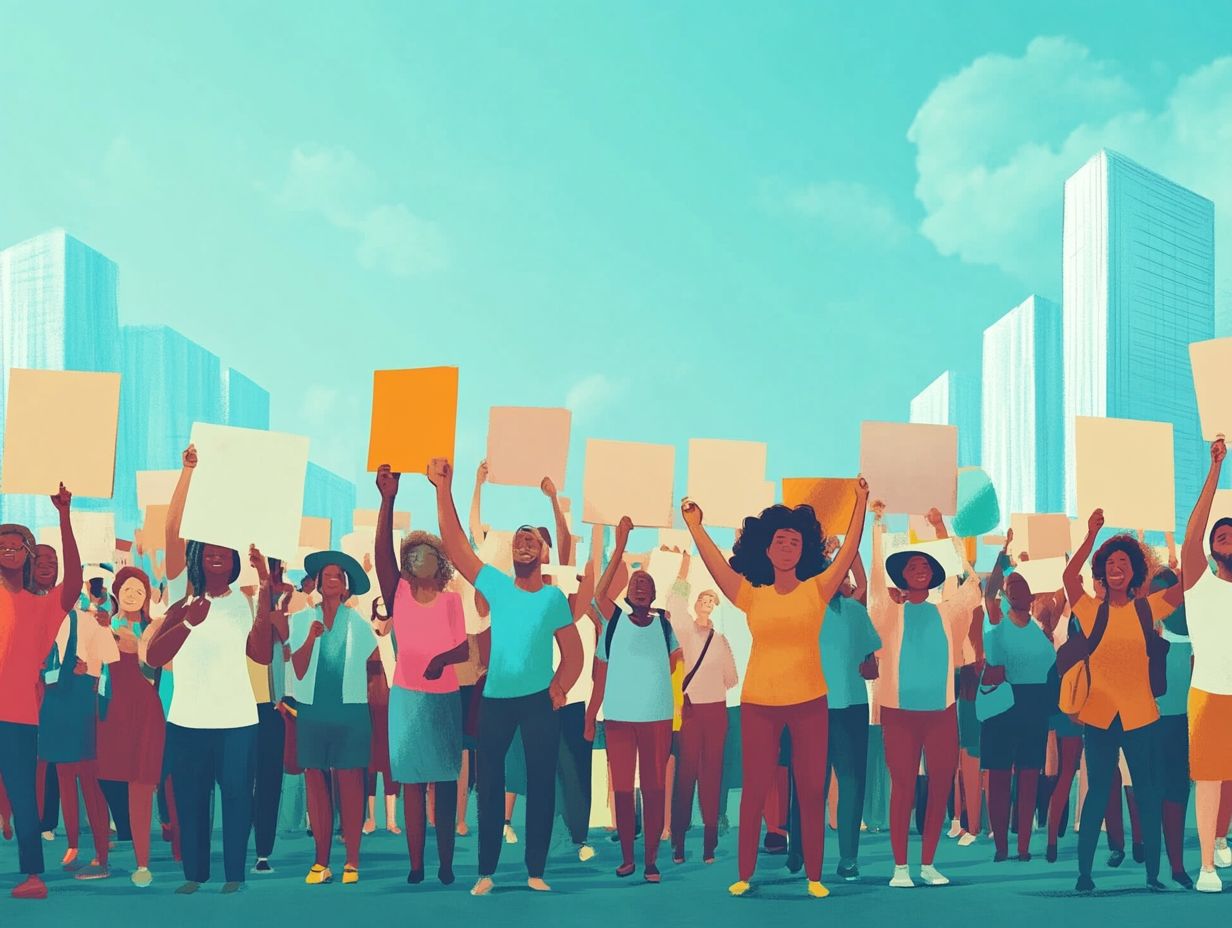
By documenting rights violations, we can shine a light on the abuses faced by vulnerable populations, such as minorities, refugees, and marginalized communities. This can lead to increased attention and support for these groups, helping prevent further violations against them.
Why is it important to have accurate and detailed documentation of rights violations?
Having accurate and detailed documentation of rights violations is essential for building a strong case against perpetrators. It ensures that the voices and experiences of victims are accurately represented and can help refute any attempts to deny or downplay the severity of the violations.
What role do human rights defenders play in documenting rights violations?
Human rights defenders play a critical role in documenting rights violations. They are often the first responders to incidents and have direct access to affected communities. They also possess the necessary skills and expertise to gather, verify, and compile evidence safely and ethically.
How can individuals contribute to documenting rights violations?
Individuals can contribute to documenting rights violations by reporting any violations they witness or experience, sharing their stories and testimonies, and supporting the work of human rights organizations and defenders. They can also raise awareness about human rights issues and encourage others to document and speak out against violations.
Are there any risks involved in documenting rights violations?
Documenting rights violations can be dangerous, but it’s vital work. Yes, there are risks involved, especially in areas with strict governments or ongoing conflicts.
People who protect human rights may face threats, harassment, or even violence. Always prioritize your safety when documenting rights violations.

